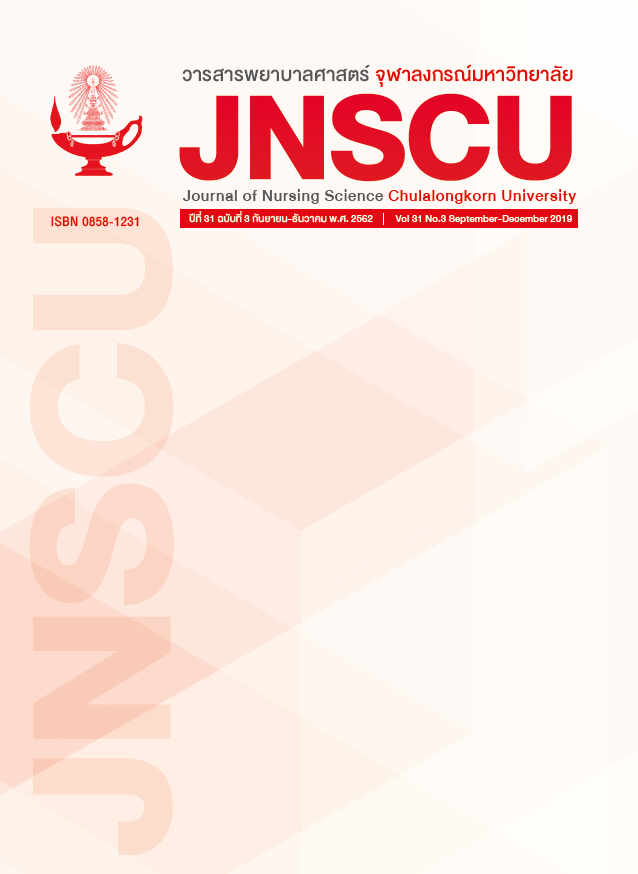ปัจจัยคัดสรรที่สัมพันธ์กับการทำหน้าที่ด้านร่างกายของผู้สูงอายุโรคหลอดเลือดสมอง
คำสำคัญ:
โรคหลอดเลือดสมอง การทำหน้าที่ด้านร่างกาย ผู้สูงอายุบทคัดย่อ
วัตถุประสงค์: เพื่อศึกษา 1) การทำหน้าที่ด้านร่างกายของผู้สูงอายุโรคหลอดเลือดสมอง 2) เพื่อการศึกษาความสัมพันธ์ระหว่าง เพศ อายุ ภาวะซึมเศร้า การสนับสนุนทางสังคม และการรู้คิด กับการทำหน้าที่ด้านร่างกายของผู้สูงอายุโรคหลอดเลือดสมอง
รูปแบบการวิจัย: การวิจัยเชิงบรรยายเชิงวิเคราะห์ความสัมพันธ์
วิธีดำเนินการวิจัย: กลุ่มตัวอย่าง คือ ผู้ที่มีอายุเกิน 60 ปีบริบูรณ์ขึ้นไป ทั้งเพศหญิงและเพศชายโรคหลอดเลือดสมอง ที่มารับบริการในแผนกผู้ป่วยนอกโรงพยาบาลราชวิถีและโรงพยาบาลศิริราช จำนวน 121 คน คัดเลือกกลุ่มตัวอย่างแบบเฉพาะเจาะจง เก็บรวบรวมข้อมูลโดยใช้การตอบแบบสอบถาม เครื่องมือที่ใช้ในการวิจัย ได้แก่ แบบสอบถามข้อมูลส่วนบุคคล แบบสอบถามการสนับสนุนทางสังคม แบบประเมินภาวะซึมเศร้าในผู้สูงอายุไทย แบบประเมินการรู้คิดและแบบประเมินการทำหน้าที่ด้านร่างกายผู้สูงอายุโรคหลอดเลือดสมอง การวิเคราะห์ข้อมูลใช้สถิติเชิงพรรณนา สถิติสหสัมพันธ์ของเพียร์สัน และสถิติไคสแควร์
ผลการวิจัย: 1) การทำหน้าที่ด้านร่างกายของผู้สูงอายุโรคหลอดเลือดสมองโดยรวมอยู่ในระดับช่วยเหลือตนเองในการทำกิจกรรมได้ดีมาก (=16.56 SD =4.11) 2) อายุและภาวะซึมเศร้ามีความสัมพันธ์ทางลบกับการทำหน้าที่ด้านร่างกายของผู้สูงอายุโรคหลอดเลือดสมองอย่างมีนัยสำคัญทางสถิติ (r =-.399, r =-.337 ตามลำดับ p< .05) 3) การรู้คิดมีความสัมพันธ์ทางบวกกับการทำหน้าที่ด้านร่างกายผู้สูงอายุโรคหลอดเลือดสมองอย่างมีนัยสำคัญทางสถิติ (r= .348, p< .05) 3) เพศมีความสัมพันธ์กับการทำหน้าที่ด้านร่างกายของผู้สูงอายุโรคหลอดเลือดสมองอย่างมีนัยสำคัญทางสถิติที่ระดับ .05 4) การสนับสนุนทางสังคมไม่มีความสัมพันธ์กับการทำหน้าที่ด้านร่างกายของผู้สูงอายุโรคหลอดเลือดสมอง
สรุป: อายุ เพศ ภาวะซึมเศร้าและการรู้คิดมีความสัมพันธ์กับการทำหน้าที่ด้านร่างกายของผู้สูงอายุโรคหลอดเลือดสมองอย่างมีนัยสำคัญทางสถิติที่ระดับ .05 การสนับสนุนทางสังคมไม่มีความสัมพันธ์กับการทำหน้าที่ด้านร่างกายของผู้สูงอายุโรคหลอดเลือดสมอง
เอกสารอ้างอิง
room/factsheets/detail/the-top-10-causes-of-death
2. Bureau of Non Communicable Disease Ministry of Public Health. Annual report 2017. Bangkok: WVO officer of printing mill; 2018.
3. Strategy and Planning Division. Public Health Statistics 2016. Nontaburi: Strategy and Planning Division Ministry of Public Health ; 2017.
4. Aekplakorn W. Thai National Health Examination Survey, NHESV th 2014. Nontaburi: Health System Research Institute ; 2016. 5
5. Pajarya K. Stroke Rehabilitation. Bangkok: Medical Education Technology center Faculty of Medicine Siriraj Hospital Mahidol University; 2007.
6. Mitchell AJ, Sheth B, Gill J, Yadegarfar M, Stubbs B, Yadegarfar M, & Meader N. Prevalence and predictors of post-stroke mood disorders: A meta-analysis and meta-
regression of depression, anxiety and adjustment disorder. General Hospital Psychiatry 2017; 47(Supplement C): 48-60.
7. World Health Organization. International classification of functioning, disability and health. Geneva: World Health Organization; 2001.
8. Srisatidnarakul B. The methodology in nursing research. 5th. Bangkok: you and I Intermedia; 2553.
9. Masskulpan P. Related Factors to Functional Outcome among Stroke Rehabilitation 2549; 31(2): 97-103.
10. Lofgren, B., Nyberg, L., Osterlind, P. O. & Gustafson, Y. In-patient rehabilitation after stroke: outcome and factors associated with improvement. Disability and
rehabilitation 1998; 20(2): 55-61.
11. Panjinda W and Choocherd P. Achieving a Holistic Approach in Stroke Rehabilitation. APHEIT International Journal 2559; 5(2): 71-78.
12. Liu X, Lv Y, Wang B, Zhao G, Yan Y and Xu D. Prediction of functional outcome of ischemic stroke patients in northwest China. Clinical Neurology and Neurosurgery
2007; 109(7): 571 - 577.
13. Cickusic A, Sinanovic O, Zonic-Imamovic M, and Kapidzic-Durakovic S. Functional recovery of patients after stroke. Acta Medica Saliniana 2011; 40(2): 58-62.
Retrieved from https://search.proquest.com/docview/1017703299?accountid=15637
14. Matsuzaki S, Hashimoto M, Yuki S, Koyama A, Hirata, Y and Iked M. The relationship between post-stroke depression and physical recovery. Journal of Affective
Disorders 2015; 176: 56–60.
15. Ahn DH, Lee YJ, Jeong JH, Kim YR, & Park JB. The effect of post-stroke depression on rehabilitation outcome and the impact of caregiver Type as a Factor of Post-
Stroke Depression. Annals of Rehabilitation Medicine 2015; 39(1): 74–80. http://doi.org/10.5535/arm.2015.39.1.74
16. Ones K, Yalcinkaya EY, Toklu BC, N. Effects of age, gender, and cognitive, functional and motor status on functional outcomes of stroke rehabilitation.
NeuroRehabilitation 2009; 25(4): 241-249. doi:10.3233/NRE-2009-0521
17. Howard MS. Gender differences in functional abilities among elderly stroke survivors in medicare managed care. Degree doctor of public health of Public Health
Morgan state university; 2007.
18. Ishigaki T, Izumi, M, Tanaka H, Ogawa T, Matsunami S, Miyao K, et al. Impacts of family support on the rehabilitation outcome of stroke inpatients at rehabilitation
hospitals in Japan— a multi-center study.Physiotherapy 2015;101: e647-e648.doi:10.1016/j.physio.2015.03.3480
เผยแพร่แล้ว
ฉบับ
ประเภทบทความ
สัญญาอนุญาต
ลิขสิทธิ์ (c) 2020 วารสารพยาบาลศาสตร์ จุฬาลงกรณ์มหาวิทยาลัย

อนุญาตภายใต้เงื่อนไข Creative Commons Attribution-NonCommercial-NoDerivatives 4.0 International License.
##default.contextSettings.thaijo.licenseTerms##


